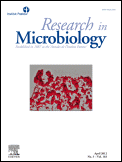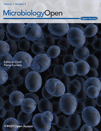
INTERNATIONAL MICROBIOLOGY
Scope & Guideline
Fostering Knowledge in the Microbial World
Introduction
Aims and Scopes
- Microbial Interactions and Ecology:
Research exploring the complex interactions between different microbial species, their ecological roles, and their impact on environmental and health-related processes. - Biotechnology and Industrial Applications:
Studies focused on the application of microbial processes in biotechnology, including enzyme production, bioremediation, and the development of microbial-based products for agriculture and industry. - Antimicrobial Resistance and Pathogenicity:
Investigations into mechanisms of resistance in pathogenic microorganisms, their virulence factors, and the development of strategies to combat infections caused by resistant strains. - Probiotics and Human Health:
Research on the use of beneficial microorganisms in health applications, including gut health, disease prevention, and therapeutic interventions. - Genomic and Metagenomic Studies:
Utilization of genomic and metagenomic techniques to analyze microbial diversity, functional potentials, and evolutionary relationships across various environments. - Environmental Microbiology:
Exploration of microbial roles in environmental processes, including biogeochemical cycles, soil health, and the impact of pollutants.
Trending and Emerging
- Microbial Bioremediation:
An increasing number of studies focus on the use of microorganisms for the bioremediation of contaminated environments, addressing issues such as heavy metal pollution and organic waste degradation. - Phage Therapy:
Research into the use of bacteriophages as a therapeutic alternative to antibiotics is gaining traction, particularly in the context of rising antimicrobial resistance. - Metagenomics and Microbiome Studies:
There is a growing emphasis on metagenomic approaches to study complex microbial communities, particularly in human health and environmental contexts. - Synergistic Effects of Microbial Interactions:
Studies exploring synergistic interactions between various microbial species, especially in the context of probiotics and biocontrol agents, are increasingly common. - Microbial Applications in Agriculture:
Research focusing on the role of microorganisms in improving soil health, plant growth, and crop resilience is trending, reflecting the importance of sustainable agricultural practices. - Innovative Antimicrobial Compounds:
The development and characterization of novel antimicrobial agents, including those derived from natural sources, are emerging as a significant area of research.
Declining or Waning
- Traditional Microbial Taxonomy:
There has been a noticeable decline in studies focused solely on classical microbial classification and taxonomy, as newer genomic methods provide more in-depth insights into microbial diversity. - Single-Organism Studies:
Research that solely focuses on individual microbial species without considering community dynamics is becoming less prevalent, as there is a growing emphasis on studying microbial communities and their interactions. - Conventional Antibiotic Testing:
Research centered on traditional methods of antibiotic susceptibility testing is waning, as newer techniques and the understanding of resistance mechanisms gain prominence. - Basic Microbial Physiology:
Studies focused on basic physiological characteristics of microorganisms without application to health, environmental, or industrial contexts are becoming less frequent.
Similar Journals

Malaysian Journal of Microbiology
Exploring the Microbial World: Research Without BordersMalaysian Journal of Microbiology is a prestigious open-access journal dedicated to advancing the field of microbiology, published by the Malaysian Society for Microbiology. Since its inception in 2005, this journal has become an essential platform for researchers and practitioners, facilitating the dissemination of innovative studies in applied microbiology, biotechnology, and infectious diseases. Based in Penang, Malaysia, this journal not only focuses on local microbiological research but also positions itself within the broader global scientific community. Although currently placed in the Q4 category in several relevant fields—including Applied Microbiology and Biotechnology, Infectious Diseases, and Medical Microbiology according to the 2023 Scopus rankings—it plays a crucial role in encouraging novel research and fostering collaboration among scientists. The journal encourages submissions that contribute to the understanding of microbial processes, disease mechanisms, and novel biotechnological applications, thereby supporting the continuous growth of knowledge in microbiology. With open access since its launch, the Malaysian Journal of Microbiology ensures that all published works are freely available to the public, enhancing their visibility and impact within the scientific community.

Jundishapur Journal of Microbiology
Bridging theory and practice in the realm of microbiology.Welcome to the Jundishapur Journal of Microbiology, a peer-reviewed publication dedicated to advancing the field of microbiology. Published by BRIEFLAND, this journal focuses on key areas such as infectious diseases and medical microbiology, offering a platform for researchers to share their findings from 2009 to 2024. Despite its current positioning in Quartile 4 across various categories in 2023, the journal provides a valuable resource for budding scientists and established professionals alike, contributing to the growing body of knowledge in these critical areas. While it is not an open-access journal, the Jundishapur Journal prioritizes the dissemination of research in the Netherlands, facilitating a deeper understanding of microbial science and its implications for public health. Join a community of innovators committed to exploring both emerging and established themes in microbiology.

RESEARCH IN MICROBIOLOGY
Exploring the intricate world of microbes and their impact.Research in Microbiology, published by Elsevier, is a prominent academic journal devoted to advancing the field of microbiology, encompassing a diverse array of topics including immunology, molecular biology, and biochemistry. Established in 1987, the journal has expanded its focus over the years, with a commendable impact factor reflecting its relevance and influence in the scientific community. Although it does not currently offer open access options, Research in Microbiology remains a crucial resource for researchers and professionals seeking to stay abreast of the latest findings and methodologies. The journal holds a respectable Q2 ranking in Medicine (miscellaneous) and a Q3 ranking in both Microbiology and Molecular Biology for 2023, highlighting its position within the scholarly landscape. With its base in France and accessible to a global audience, Research in Microbiology continues to foster scholarly exchange, making it an essential platform for the dissemination of impactful microbiological research.

ANNALS OF MICROBIOLOGY
Innovating in microbiological science for a healthier world.ANNALS OF MICROBIOLOGY is a prestigious journal dedicated to advancing the field of microbiological research, published by BMC, renowned for its commitment to providing open access to vital scientific findings. With its ISSN 1590-4261 and E-ISSN 1869-2044, this journal provides a platform for the dissemination of high-quality research since its inception in 1997. Renowned for its rigorous peer-review process, it has attained a commendable Q2 ranking in the Applied Microbiology and Biotechnology category in 2023, reflecting its significant contributions to the discipline. Positioned within the 67th percentile among its peers in Scopus rankings, ANNALS OF MICROBIOLOGY continues to facilitate the exchange of innovative ideas and methodologies, serving as an essential resource for researchers, professionals, and students alike. The journal covers a broad spectrum of topics, emphasizing the intersection of microbiology with applied sciences, thereby fostering an environment that encourages collaboration and advancement in this vital field. Scholars seeking to stay at the forefront of microbiological studies will find ANNALS OF MICROBIOLOGY an invaluable addition to their academic pursuits.

Microbial Physiology
Fostering Discoveries for Health and SustainabilityMicrobial Physiology is a premier, peer-reviewed journal published by KARGER, dedicated to advancing the field of microbiology through innovative research and reviews. With an ISSN of 2673-1665 and an E-ISSN of 2673-1673, the journal stands out in the academic landscape having established a strong track record since its inception in 2020, converging its scope until 2024. It proudly holds a Q2 category ranking in several key areas including Applied Microbiology and Biotechnology, Biochemistry, and Microbiology, making it an essential resource for researchers and professionals in these disciplines. The journal provides open access options to ensure that cutting-edge findings are widely disseminated, fostering collaboration and knowledge sharing. As a vital contributor to the ongoing discourse in microbial physiology, the journal serves as a platform for novel discoveries and methodologies that can significantly impact health, industry, and environmental sustainability. Located in Basel, Switzerland, it brings together a global community of scholars eager to further explore the complexities of microbial life.

INDIAN JOURNAL OF MICROBIOLOGY
Connecting Ideas, Cultivating Microbial ExcellenceINDIAN JOURNAL OF MICROBIOLOGY, published by Springer, serves as a vital platform for the dissemination of cutting-edge research in the field of microbiology. With an ISSN of 0046-8991 and an E-ISSN of 0973-7715, this esteemed journal invites contributions that span various disciplines within microbiology, encompassing both fundamental studies and applied research that can impact health, environment, and industry. Recognized in the Q3 category in Microbiology for 2023, and ranking #80 out of 182 in Scopus’ Microbiology category, it reflects its commitment to quality and significance in the academic community. Authors and researchers benefit from the journal's comprehensive review process, which enhances the visibility and reach of their work. While no open access options are currently offered, the INDIAN JOURNAL OF MICROBIOLOGY remains a premier choice for those aiming to contribute to the ongoing dialogue in microbiological studies, ensuring that knowledge continues to evolve and thrive.

WORLD JOURNAL OF MICROBIOLOGY & BIOTECHNOLOGY
Connecting Theory and Practice in Life SciencesWORLD JOURNAL OF MICROBIOLOGY & BIOTECHNOLOGY, published by Springer, serves as a pivotal forum for advancing the fields of microbiology and biotechnology since its inception in 1990. Located in the Netherlands, this esteemed journal has secured a prominent position in the academic landscape, recognized for its strong impact factor and prestigious Q2 category rankings across disciplines such as Applied Microbiology, Biotechnology, and Physiological Sciences. Researchers and professionals utilize this journal to disseminate innovative findings and explore emerging technologies that are transforming the scientific landscape. With a robust submission rate and high visibility among the academic community, the journal fosters interdisciplinary collaboration, encouraging discussions that bridge gaps between theory and practical applications. As it converges into 2024, the WORLD JOURNAL OF MICROBIOLOGY & BIOTECHNOLOGY continues to be a vital resource for scholars aiming to enhance our understanding of microbial processes and biotechnological advances.

Microbial Genomics
Exploring the Frontiers of Microbial GenomicsMicrobial Genomics, an esteemed journal published by the Microbiology Society, is a leading platform dedicated to the rapidly evolving field of microbial genomics. Since its transition to Open Access in 2016, this journal has consistently aimed to promote unprecedented transparency and accessibility in scientific research. Based in the United Kingdom, Microbial Genomics serves a diverse international audience, providing an invaluable resource for researchers, professionals, and students interested in genomics, microbiology, and related fields. With impressive quartile rankings in 2023, including Q1 status in Epidemiology, Genetics, and Microbiology, alongside strong performance in other categories, the journal is positioned at the forefront of academic discourse and innovation. This journal's commitment to excellence is not only reflected in its rigorous peer-review process but also in its dedication to showcasing groundbreaking research that informs current practices and shapes future trends in microbial science. As researchers explore the intricacies of microbial genomes, Microbial Genomics remains an essential resource fostering knowledge and collaboration in the scientific community.

ANAEROBE
Innovating Insights into Clinical Applications of AnaerobesANAEROBE is a highly regarded scholarly journal published by Elsevier Science Ltd, dedicated to advancing the study of anaerobic microorganisms and their roles in infectious diseases, microbiology, and various clinical applications. With an ISSN of 1075-9964 and an E-ISSN of 1095-8274, this journal has established itself as a pivotal resource for researchers and professionals interested in the unique aspects of anaerobic biology since its inception in 1995. Ranking in the Q2 category in both Infectious Diseases and Microbiology, it stands out for its commitment to publishing high-quality research that reflects the evolving complexities of microbial interactions in health and disease. Although the journal currently does not offer Open Access options, its impact is notable, with the 2023 Scopus rankings reflecting a practice of excellence—ranked #137/344 in Infectious Diseases and #96/182 in Microbiology. As a vital forum for scholarly exchange, ANAEROBE serves as an essential platform for scientists seeking to explore the depths of anaerobic studies, shaping future discoveries and clinical advancements.

MicrobiologyOpen
Connecting researchers to the pulse of microbiological advancements.MicrobiologyOpen is a prestigious, open access journal published by WILEY, dedicated to advancing the field of microbiology. Since its inception in 2012, this journal has firmly established itself as a significant platform for researchers, professionals, and students alike, facilitating the dissemination of high-quality research findings across a wide range of microbiological disciplines. With an impressive impact factor and a ranking in the 76th percentile of Scopus for immunology and microbiology, MicrobiologyOpen offers a robust forum for innovative studies, reviews, and compelling insights that push the boundaries of scientific understanding. The journal's commitment to open access ensures that groundbreaking research is freely available to the global community, fostering collaboration and knowledge-sharing. As it continues to evolve until 2024, MicrobiologyOpen remains pivotal for anyone looking to stay at the forefront of microbiological research.